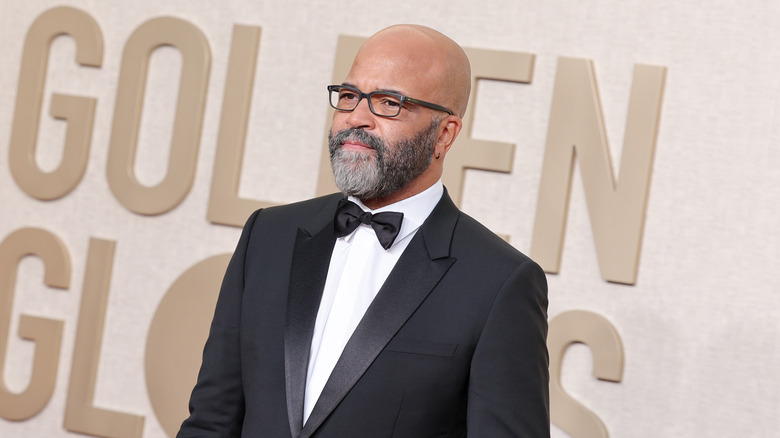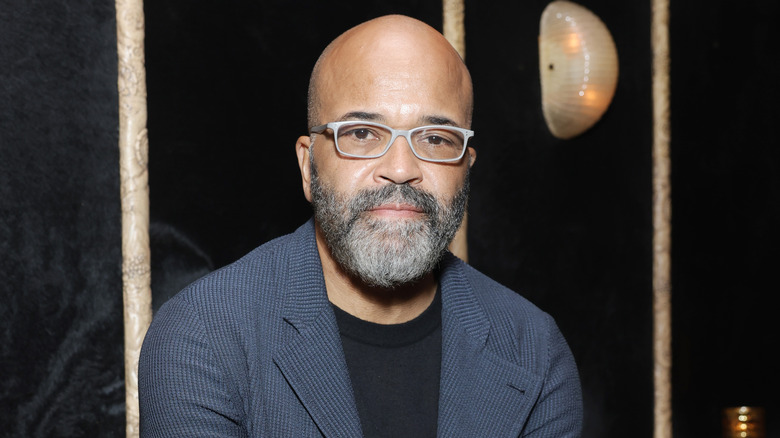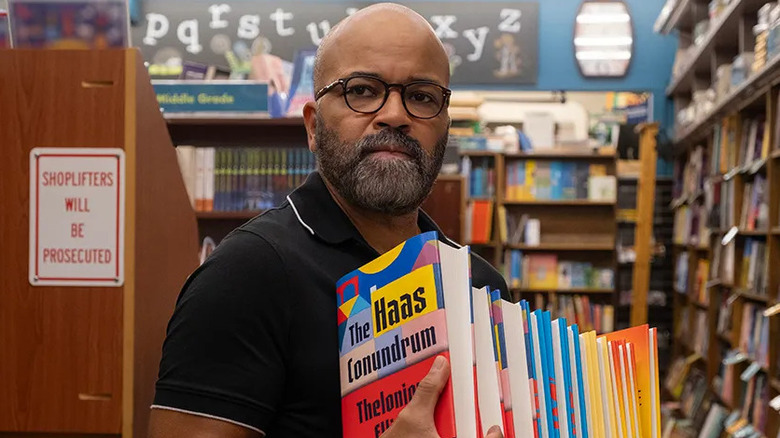Jeffrey Wright's Dialogue Was Replaced In An Ang Lee Movie For A Shocking Reason
Jeffrey Wright, at this point, is one of the most well-known and dependable actors working in Hollywood today, whether he's lending his voice to Marvel's "What If...?" or providing excellent supporting roles in dystopian fare like "Westworld" and the "Hunger Games" films. However, before he cemented his place in the industry, his early career faced its fair share of struggles, such as when he was asked to dub over a pivotal piece of dialogue while working on the 1999 Ang Lee film "Ride with the Devil."
During Entertainment Weekly's Around the Table panel discussion with Wright and his "American Fiction" co-stars Tracee Ellis Ross, Sterling K. Brown, and Erika Alexander, Wright revealed that the movie — which was an adaptation of Daniel Woodrell's novel "Woe to Live On" and co-starred Mark Ruffalo, Margo Martindale, Tobey Maguire, Jonathan Rhys Meyers, and even songstress Jewel — required his character Daniel Holt to say one very specific word. Since Wright's Daniel is, in the movie, a freed slave fighting for a group of pro-Confederate irregulars, it seems appropriate, and Wright certainly thought it was.
"In this scene in which he has this, kind of the apex of his awakening and his need to emancipate himself, he says, 'Being that man's friend was no more than being his n—–. And I will never again be anyone's n—–,'" Wright told his co-stars. "And it's such a self-empowering statement and understanding of the word."
Jeffrey Wright flat-out refused to dub over a line he felt was significant
During the discussion, Jeffrey Wright went on to say that when the film's studio and distributors — Universal Studios, Good Machine Productions, and USA Films, respectively — were unsure of how to market a film with such difficult subject matter, they sort of just gave up on giving it any publicity whatsoever. Not only that, but Wright recalled that he was asked to dub over the vital word from his pivotal line for what he said the studio called the "airplane version of the dialogue" (a clean one). Wright refused.
"I said, 'Nah. That's not happening,'" Wright revealed. And they found some other actor to come in and do that one word, apparently, so that the airplane folk would be comfy in the darkness of their own ignorance around the language of race." The identity of that other actor isn't revealed in the roundtable, but it's absolutely notable that Wright stuck to his principles and chose not to dub over the line himself, especially since he was not an established star. One thing feels certain, though: Wright has such a distinctive voice that unless the actor who stepped in is an incredible impressionist, the "airplane version" probably sounds just a little bit off.
These days, Jeffrey Wright is earning critical acclaim for his role in American Fiction
Despite that dialogue-dubbing snafu, Jeffrey Wright stayed booked and busy throughout the years, appearing in everything from "Syriana" to Wes Anderson films like "The French Dispatch" and "Asteroid City." After playing Beetee in the "Hunger Games" films, he joined another franchise, playing Commissioner Jim Gordon in Matt Reeves' reboot "The Batman" alongside Robert Pattinson and Zoë Kravitz. Then, after years of supporting roles, Wright scored a major lead role in Cord Jefferson's "American Fiction," which earned the actor a Golden Globe nomination for best actor in a musical or comedy.
"American Fiction" casts Wright as Thelonious "Monk" Ellison, a writer with a few hits under his belt whose career seems to be flagging. After encountering serious financial issues in his family and losing his job as a college professor, Monk drunkenly concocts a pretty ridiculous gambit: he writes what he dubs a "Black" book that leans into every possible negative stereotype. To his complete dismay, publishers froth at the mouth over the first draft, initially titled "My Pafology" (though, in a moment of pure insouciance, he changes it to "F***" later on), and the book is a runaway hit. As he juggles a budding relationship with his new flame Coraline (Erika Alexander) and tries to take care of his ailing mother, Monk has to grapple with the fact that he's living a lie and is constantly prepared for the entire situation to blow up in his face. "American Fiction" is a perfect vehicle for Wright — and, suffice to say, the script lets him say absolutely anything he wants.
"American Fiction" is in theaters now.


